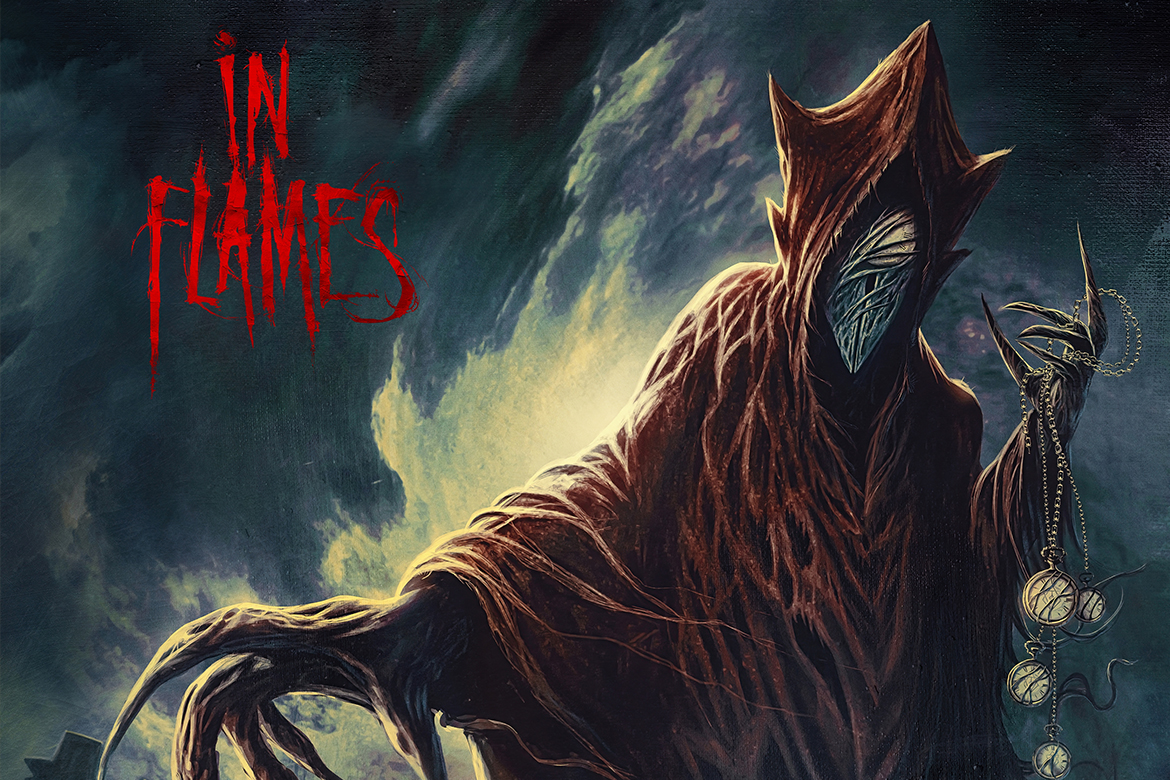“Your time’s up, now there’s hell to pay.”
In Flames have long since been a complicated case within the metal community. While their early work throughout the ‘90s and ‘00s are revered as some of the genre’s best, as the band grew and changed over time, so did their sound. It’s a common story – and one in which I almost unanimously stand with artists. After you’ve spent so much time writing within a specific genre bound, it’s almost a certainty that you will become disillusioned with that sound at some injunction.
While the band has remained in great success throughout their gradual sound change from melodic death metal to a more overtly metalcore/alt-metal oriented sound, it’s no secret that many legacy fans have called for the band to return to their roots. Of course, In Flames owe no one anything in that regard – but it seems that they’ve been listening, and perhaps even agreeing. While 2020’s Clayman re-release was met with an incredibly mixed response, it seems that with 2023’s Foregone the Swedish metal veterans have finally figured it out, so to speak.
Foregone wastes absolutely no time in establishing its intent and aesthetic. Harking back to the era of ‘90s/’00s metal the band came up and established themselves in, it’s a welcome change of pace for the group after so many years straying away from their formative sound. While the album as a whole is not overtly based around a melodeath sound, the group seem to have made a concerted effort to re-introduce that sound alongside the alternative metal and core-adjacent stylings of their later efforts.
Introductory track “The Beginning Of All Things That Will End” kicks Foregone off in classic noughties metal fashion – a gorgeous acoustic intro, replete with harmonised riffing and smooth strings. It’s truly the calm before the storm, as the brutal melodeath aesthetics of following cuts “State Of Slow Decay” and “Meet Your Maker” mince no words in welcoming you to Foregone’s heavier edge. Fierce vocals, angular riffs and pacey drums permeate the soundscape of the album’s opening moments, making a quick and lasting impression on the listener.
That said – particularly in the former of the two heavy openers, I do feel that the structure and variety in sound leaves a tad to be desired. While on the whole a serviceable melodeath track, the very strictly A/B/A/B structure of the “State Of Slow Decay”, down to a full repetition of its instrumental twice over, gets tiring quicker than it should.
The group quickly pump the breaks with “Bleeding Out”, opening with a more Alter Bridge-esque riff than the outwardly melodeath/core-adjacent style of the previous cuts. Far more clean-vocal oriented than the previous cuts, too, “Bleeding Out” proves to be a starkly different track aesthetically, but one that stands out. Providing an infectious chorus and a technical, sweeping thrash solo, while “Bleeding Out” certainly doesn’t pack the punch of its predecessors, it loses none of its songwriting proficiency in the process.
What follows is the album two-part title track, “Foregone”. Truthfully, while both of these tracks are fun metal cuts in their own right, being purported as a two-part song feels strange. Both songs contrast quite heavily in style and structure, with the first of the two feeling like an at-times blisteringly heavy progressive death metal track, but the second encompassing more of an alternative metal style. Further to this, the transitional point between the two tracks is non-existent, with both parts ending quite abruptly. While the tracks themselves are more than serviceable in their own respective ways, the two-part nature of these cuts left me scratching my head a little.
Moving forward, however, the album’s second half harbours some of the album’s greatest highlights. “In The Dark” feels heavily reminiscent of fellow Swedish former-melodeath veterans, Opeth, with its strangely timed riffing and progressive structure. Further, while the lyrics present in “A Dialogue In b Flat Minor” toe the line of crossing that line to making a “voices in my head” track thematically, leaning a tad too much into that modern metalcore pastiche for my liking, musically the track stands out greatly. There’s a primal, chest-beating fury to the rhythmic structure here that’s present throughout most of the track, and its gorgeous acoustic outro begs to be admired.
While the album’s closer, “End The Transmission”, proves to be one of the most sonically diverse of the bunch, I couldn’t help but feel that it wasn’t quite dwelling on each of its individual elements enough. Jumping between melodeath, metalcore and alt-metal at blistering pace, you almost get no time to appreciate each individual element here, due to the track’s intent to swiftly move between each sound. It’s a shame too, because what’s present within each section proves to contain some of the album’s strongest performances.
As a whole, I believe In Flames’ Foregone to be a marked return to form for the Swedish metal veterans. It feels like a true love letter to the ‘90s/’00s era of metal that the band came up in, and while the entire package isn’t quite as strong as a few of its key moments, every song here is at least serviceable in its execution. While a few more overtly melodeath tracks would have been welcome, it’s clear that In Flames have a firm grasp on their utmost strengths as a group through some of these cuts. In a perfect world, a future album would see some of these sounds fully realised and implemented equally, but until then, Foregone is a welcome return to form that I will likely be returning to for some time.
7.5/10
Foregone will release this Friday, February 10th, via Nuclear Blast, and you can find pre-orders for the record here.

